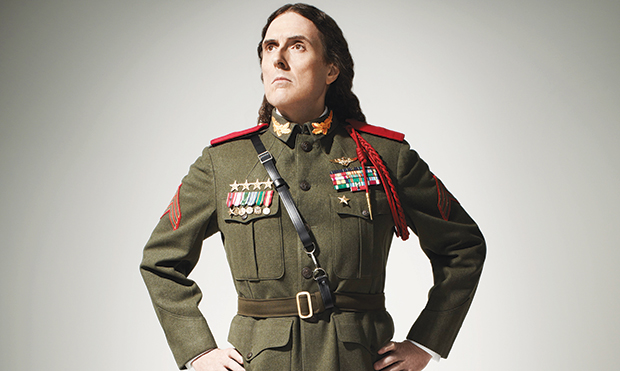Weird Al Yankovic peaked commercially in the 38th year of his career. His 2014 release, Mandatory Fun, debuted at number one—unprecedented for a comedy album. But this singular success provides a fitting coronation for the four-time Grammy winner, who has long been the jester in the court of A-list pop.
“I thought it was a pretty nice mic drop,” Yankovic says. “Of course, I was happy with the album and proud of it and hoping for the best, but I never in a million years would have thought it would have been number one.”
The album features his typical gung-ho approach to genres, riffing on a Pixies vibe to bemoan spotty WiFi and low thread counts on “First World Problems” and one-taking a star-studded music video for “Tacky,” a garish reimaging of Pharrell’s “Happy.” But Yankovic has always been an unrestrained performer. In his teens, the former valedictorian handed a tape of parodies to radio icon Dr. Demento who dug the sincerity of the braces-wearing accordionist. And starting with ’80s icons like Madonna and Michael Jackson, Yankovic has released 14 albums and built—no joke—one of the most diverse discographies ever.
“I like to be as eclectic as possible,” he says. “And that’s not because I’m good at all these genres. It’s because I’m shameless and I have a lot of unearned confidence. I basically convince myself that I can do anything and give it my best shot.”
After receiving wary permission from major names early in his career, Yankovic’s parodies have become a rubber stamp of relevance. He scored his biggest hit with “White & Nerdy” a mirror of “Ridin,’” Chamillionaire’s ode to dodging cops. When they met, the rapper thanked Yankovic as he believed the parody had ratified the importance of his single that won the Grammy for “Best Rap Performance” in 2007.
“For the first 15 years of my career, people kept wondering why I wasn’t going away,” he says. “But I’ve been around for so long, and had a measure of success and a whole generation has grown up with me. So all of a sudden, people are thinking like, ‘Oh, you’ve got your platinum album. You’ve got your Grammys. But where’s your Weird Al parody?’ That’s the real sign of success.”
In the modern era of pointed, political satire, Yankovic’s apolitical, surreal brand stands distinct. He recycles pop into the raw materials for a giddy alternate universe stripped of cutting edges. His refusal to “go for the jugular” has attracted some critical derision, but Yankovic stands behind his anti-confrontational tone.
“I think it’s more of a challenge to be funny without stepping on somebody’s toes or being offensive or vulgar,” he says. “A lot of people say, ‘Your comedy is great at a time such as now where there’s so many horrible things that are going on.’ But I don’t know where there has been a time where there wasn’t something horrible going on. There’s never been a time where people said, ‘Gee, we sure don’t need comedy right now. Things are just great.’”
A meticulous writer, Yankovic drafts multiple options for each lyric. He wobbles between smart and dumb humor, excelling both at slapstick gags and brainy rants like “Word Crimes,” a parody of “Blurred Lines.” While rapping and singing falsetto, he brandishes his grand vocabulary to savage improper English mutations, zagging away from the obvious target of the song’s semi-consensual sexual vibe—a concept that had already been rampantly spoofed on Youtube.
Despite being the “only game in town” in his early career, Al has transitioned smoothly to the crowded internet era. His album’s massive success owes in part to his release of eight music videos in eight days, a sowing of viral content that snowballed anticipation.
Weird Al’s legacy has been cemented. His wacky covers have often been imitated, but never replicated. Ever since MTV actually played music videos, he’s been our most taken-for-granted icon—the undisputed champion of weird.
“At some points in my life, I wonder whether it was a great idea to give myself the moniker ‘Weird Al’ because it hasn’t helped in the respect department,” he says. “But I’ve heard from a lot of kids that it was very empowering because they thought they were weird or different. So for that reason alone, it makes me glad. I’ve always flown my freak flag pretty high.”
Weird Al
Jul 24, 7pm, $55-$75
City National Civic, San Jose



